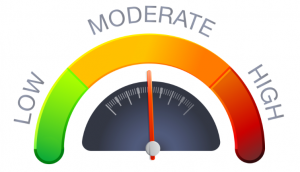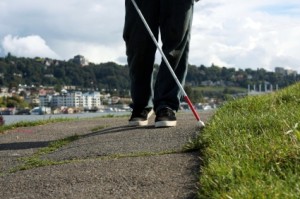
Based on your answers to the quiz questions your Eyesight Toxicity Score is MODERATE.
This score was calculated based on factors such as age, gender, and lifestyle. But don’t worry … this is nothing to be alarmed about.
PLEASE NOTE: Scoring in the “Moderate” category does not mean you’re destined for eyesight trouble, nor does scoring in the “Low” category wholly protect you from deteriorating eyesight. Rather, now is the time to learn more about why you landed in this category and what you can do about it.
As we age our eyes may build up toxins through diet and environment.
These toxic levels affect the overall health of your eyes and are linked to deteriorating vision and even blindness. Read below to learn more about your risk level and what you can do to protect your eyesight.
Question #1 – Are You Male or Female: When it comes to eye health it seems that men are luckier than women. There are more women than men who are blind or visually impaired. Women’s Eye Health Task Force reports that nearly two-thirds of all visually impaired blind people in the world are women. More women than men have eye diseases such as cataracts and macular degeneration. Research has shown there are gender specific symptoms, conditions and risks associated with vision loss. (i)
Question # 2 – Your Age: Since your 40’s, you have probably noticed that you needed glasses to see up close. You may have more trouble adjusting to glare or distinguishing colors, particularly shades of blue and green. These changes are a normal part of aging. They alone cannot stop you from enjoying an active lifestyle or maintaining your independence. But as you age, you should know that you are at higher risk of developing age-related eye disease and conditions.
How Your Age Affects Eye Conditions and TOXICITY:
Age related macular degeneration (AMD): AMD is a common disease among people aged 60 and older, and it is the most common cause of blindness in people over 55 years old. It gradually  destroys the macula, the part of the eye providing sharp, central vision needed for seeing objects clearly. Approximately 10% of patients 66 to 74 years of age will have findings of macular degeneration. The prevalence increases to 30% in patients 75 to 85 years of age. Roughly, 15 million Americans have AMD and almost 2 million have the advanced form. If you or a loved one has AMD, then to learn how to slow age related macular degeneration and reduce your risk of vision loss.
destroys the macula, the part of the eye providing sharp, central vision needed for seeing objects clearly. Approximately 10% of patients 66 to 74 years of age will have findings of macular degeneration. The prevalence increases to 30% in patients 75 to 85 years of age. Roughly, 15 million Americans have AMD and almost 2 million have the advanced form. If you or a loved one has AMD, then to learn how to slow age related macular degeneration and reduce your risk of vision loss.
Cataract: This is a clouding of the eye’s lens and is common in older adults and people with diabetes. Cataract affects nearly 22 million Americans age 40 and older. By age 80, more than half of all Americans have cataract.
Diabetic retinopathy: Is the most common condition among people with diabetes. It damages blood vessels in the retina, usually in both eyes. If you have diabetic retinopathy, then you should control your blood sugar, blood pressure, and cholesterol. This affects more than 4.4 million American 40 years and older.
Glaucoma: Glaucoma is caused by fluid in the eye building up and damaging the optic nerve. Glaucoma affects almost 2.3 million Americans age 40 and older.
Low Vision: People who have age-related eye disease are more likely to develop low vision. Low vision means that, even with regular glasses, contact lenses, medicine, and surgery, everyday tasks are difficult to do. Reading the mail, shopping, cooking, seeing the TV, and writing can seem challenging.
Question #3 – Do You Have a Relative with Age Related Macular Degeneration (AMD): Age related macular degeneration is the leading cause of blindness in baby boomers and older adults. Your risk of developing AMD increases if you have a relative who has age related macular degeneration.
Question #4 – Do you typically drink 3 alcoholic drinks per day: Moderate alcohol consumption may decrease your risk of eye toxicity due to free radical damage, however, too much alcohol will have a damaging affect. Recent medical research suggests that one glass of red wine per day for men three glasses of red wine per week for women may actually offer some protection against toxicity build up and diseases like macular degeneration. This may because it protects blood vessels in your eyes with antioxidants found in wine.
According to the Mayo Clinic, “Antioxidants in red wine called polyphenols may help protect the lining of blood vessels in your heart. A polyphenol called resveratrol is one substance in red wine that’s gotten attention. Resveratrol might be a key ingredient in red wine that helps prevent damage to blood vessels, reduces low-density lipoprotein (LDL) cholesterol (the “bad” cholesterol) and prevents blood clots.” (ii)
Question #5 – Do You Smoke: Smoking is bad for your health… period. Smoking causes a plethora of health issues, disease, and complications. It has also been linked to a higher risk of eye diseases like macular degeneration. Smoking increases free radicals in your body, which raises body toxicity levels as well as eyesight toxicity levels.
Question #6 – What is the #1 WORST food for your eyes and vision: We’ve been hearing for years that sugar is bad for you, but did you know that it may be worse than smoking? One study found that drinking two cans of sugary soda per day accelerated biological aging by 4.6 years! Sugar was actually making them age faster! The study focused on a part of chromosomes called telomeres which have previously been linked to human lifespan. Telomeres are found at the end of chromosomes and help protect DNA. Telomeres naturally get shorter as we age which can result in damage to the DNA. Shorter telomeres can increase one’s chances of developing several age related diseases including, heart disease, diabetes, and Alzheimer’s. Scientists at the University of California in San Francisco say that soda physically shortens telomeres decreasing life cycle and can lead to development of some forms of cancer.
Question #7 – Do You Eat Green Leafy Vegetables: Green leafy vegetables are nature’s vitamin and mineral factories. Studies have shown that green leafy vegetables do offer some protection from free radicals and eyesight toxicity. Researchers however do not know for sure how much you need on a daily basis for maximum protection. Preliminary results say that anybody interested in their eye health should eat at least one serving (1 cup) of green leafy vegetables every day.
Question #8 – Do You Get Regular Eye exams: Early detection of eye problems is currently one of the best defenses against later problems. If you are over 55, then you should get your eyes examined by your eye care professional at least once per year. If you have an eye disease like macular degeneration, then you should get it monitored every 6 months.
Question #9 – Do You Take Vitamins: Vitamins with specific antioxidants are known to support ocular health. Antioxidants keep free radicals under control, reducing eyesight toxicity. However, not all eye vitamins are created equal. It is important to take a daily vitamin that contains the 7 “magic” nutrients that have been found to fight age related eye conditions.
Sources:
[i] Author: Audrey Demmitt Source: http://www.visionaware.org/blog/peer-perspectives-on-living-with-vision-loss/more-women-than-men-have-vision-loss/12
[ii] Source: http://www.mayoclinic.org/diseases-conditions/heart-disease/in-depth/red-wine/art-20048281
[iii] Source: http://www.webmd.com/food-recipes/features/how-antioxidants-work1
Disclaimer: The material on this site is provided for informational purposes only and should never be construed as medical advice. Always consult your physician before beginning any diet or exercise program or implementing any of the information found on this website. The views and opinions expressed on this website are solely those of the original authors and other contributors. These views and opinions do not necessarily represent those of DailyHealthAlerts.com, and/or any/all contributors to this site. There are no typical results when following or implementing any information found on this website and your results will vary. Although not always true, you must assume that our company has an affiliate relationship with the retailers of the products and services advertised or recommended on this site and that we will be compensated if you purchase these items. These statements have not been evaluated by the Food and Drug Administration. This product is not intended to diagnose, treat, cure, or prevent any disease.

